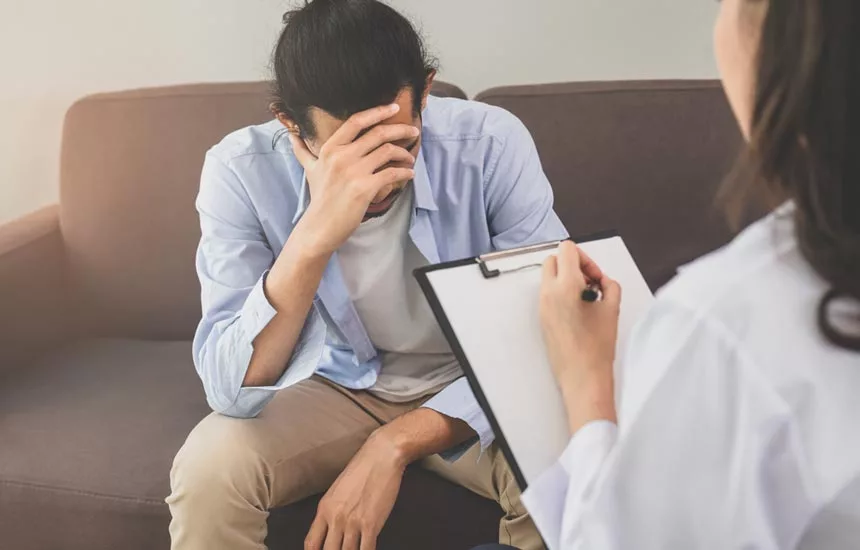What is Bipolar Disorder?
Table of Contents
- What is Bipolar Disorder?
- Is There a Bipolar Disorder Test?
- What are the Symptoms of Bipolar Depression?
- What are the Symptoms of Bipolar Mania?
- What are Patterns of Depression and Mania in Bipolar Disorder?
- Bipolar Disorder and Addiction
- Living with Bipolar Disorder
- FAQs on Bipolar Disorder Tests
- Find Mental Health Rehabs and Recovery Support Today
- Medically Reviewed By
Formerly known as manic depression, bipolar disorder is a mental health condition that can cause you to experience extreme mood swings. These typically include emotional highs, referred to as mania or hypomania, and lows, or depression.
A depressive episode is typically characterized by feelings of sadness or hopelessness, as well as a loss of interest in most activities. Hypomania on the other hand, while less extreme than mania, can cause feelings of euphoria, energy, or irritability. A bipolar disorder test can help you determine if this may be affecting you.
These mood swings can also affect your sleeping cycle, energy levels, activity, judgment, behaviors, and your ability to think clearly.
These mood swings can be a rare occurrence for some people, while for others this may be something that takes place several times throughout the year. Furthermore, not everyone with bipolar disorder will experience the same symptoms.
Bipolar spectrum disorders are a life-long diagnosis, but with the right treatment plan and coping mechanisms, this condition can be managed.
Keep reading to find out more about various forms of bipolar disorder tests and how to get effective help if you are struggling with mental health!
Is There a Bipolar Disorder Test?
While you will need to speak with a mental health professional to receive a proper diagnosis for bipolar disorder, there are several online tools that can allow you to self-test and determine whether you may have this condition.
Below is a list of symptoms associated with both depressive episodes and mania. If you have concerns over whether you may have bipolar disorder, it may be helpful to talk with your healthcare provider.
What are the Symptoms of Bipolar Depression?
For someone who is experiencing a depressive period of their bipolar disorder, they may experience several symptoms, including:
- Feeling unusually sad, hopeless or irritable for long periods of time.
- Lacking energy or sleeping more than usual.
- Having difficulty concentrating and remembering things.
- Experiencing a loss of interest in usual activities and routines.
- Feeling empty or worthless.
- Feeling guilty or in despair.
- Feeling unusually pessimistic or negative.
- Having feelings of self-doubt.
- Having episodes of delusions, hallucinations or disturbed or illogical thinking.
- Losing your appetite.
- Having difficulty sleeping.
- Having suicidal thoughts or ideations.
If you have or are currently experiencing any of these symptoms, this may be a sign of a more serious underlying issue. It is important to seek out professional help when trying to navigate through these difficult feelings.
What are the Symptoms of Bipolar Mania?
For those in a manic phase of bipolar disorder, they may experience symptoms such as:
- Feelings of increased happiness, elation or joy
- Talking more or faster than usual
- Feeling very energetic
- Feeling self-important
- Feeling full of inspiration or motivation
- Being more easily distracted
- Feeling more irritated or agitated easily
- Having episodes of delusions, hallucinations or disturbed or illogical thinking
- Having trouble sleeping or increased wakefulness
- Having a decreased appetite
- Taking more risks or engaging in dangerous and otherwise out-of-character activities, such as spending large amounts of money or having unprotected sex
What are Patterns of Depression and Mania in Bipolar Disorder?
For many people with bipolar disorder, they may have more depressive episodes than they do mania, or vice versa. They may have multiple episodes per year, while other times they may experience these episodes less often.
Ultimately, the patterns and quantity in which these episodes occur are not always the same for everyone, but may include:
- Rapid cycling: This is when someone with bipolar disorder frequently and repeatedly switches between high to low phases, usually without experiencing a normal period in between these episodes.
- Mixed state: This is when a bipolar individual will experience symptoms of both depression and mania at the same time; for example, having large amounts of energy while simultaneously having depressing or negative thoughts.
In order to be diagnosed with bipolar disorder or a variant of this condition, an individual will usually have to experience at least one episode of the above-mentioned states within the span of a year.
Bipolar Disorder and Addiction
Many people with mental health disorders also struggle with substance abuse and addiction. These are referred to as co-occurring disorders or dual diagnoses. In many cases, the extreme highs and lows of bipolar disorder can lead to substance abuse.
This is because the euphoric highs produced by certain substances can provide temporary relief to the extreme lows of bipolar depression. In other cases, someone in a manic state may experiment with drugs due to their increased risk-taking behaviors.
Regardless of why the individual began abusing drugs or alcohol, this will not provide permanent relief from their symptoms, and can actually make their condition worse over time.
If this occurs, they will need professional addiction and mental health treatment to be able to overcome these habits and achieve a healthier, substance-free lifestyle.
Living with Bipolar Disorder
As discussed, bipolar disorder is a condition characterized by states of extremes. In many cases, someone with this disorder may not even realize when they may be in a depressive or manic state until after it is over.
Unfortunately, being unaware of what is going on in the moment may cause them to engage in self-destructive behaviors, which may also cause harm to others in the process.
The extreme nature of this disorder can also make staying in a job or maintaining personal relationships very difficult, making the struggling person’s quality of life drastically decrease.
This is why getting the right help for this condition is so important. Fortunately, there are various types of therapy and medications that people with this disorder can take to help manage their symptoms and develop healthy coping mechanisms.
FAQs on Bipolar Disorder Tests
Can I self-test for bipolar disorder?
Although an online test can help you determine the potential presence of a form of bipolar disorder, they are not the preferred method of diagnosis. Speaking with a qualified and accredited mental health professional is the best approach to accurately diagnosing your condition.
How can I find a health professional to treat my bipolar disorder?
With many providers now offering online help, you might find your insurance policy already covers access to online mental healthcare. If daily living is significantly impacted by bipolar disorder, Find Addiction Rehabs can help with finding inpatient rehabs that treat mental health conditions effectively and in accredited settings.
Find Mental Health Rehabs and Recovery Support Today
If you or a loved one is struggling with mental health and/or addiction, know that you are not alone, and help IS available. At Find Addiction Rehabs, we understand the importance of finding recovery resources that can address all of your needs, up to and including mental health rehab facilities.
Our hotline is available 24/7 to connect you with treatment providers and rehab programs that will treat not just your substance use habits, but the underlying causes as well. So don’t wait; call now, and let us help you get started on your path to recovery, today!
Deborah Tayloe is a freelance writer specializing in health and sciences. Deborah earned a B.S.Ed. in Secondary Education/English, accompanied by a Spanish minor. Her writing expertise allows her to craft engaging, impactful articles to help people be well.
In addition, she holds a fully accredited Certificate of Natural Medicine and is a certified Herbalist. Through her understanding of complementary medicine, Deborah helps medical professionals give people the information they need to embrace natural approaches to wellness.
When she’s not working, Deborah trains for 5K races and advocates for animal rights.




